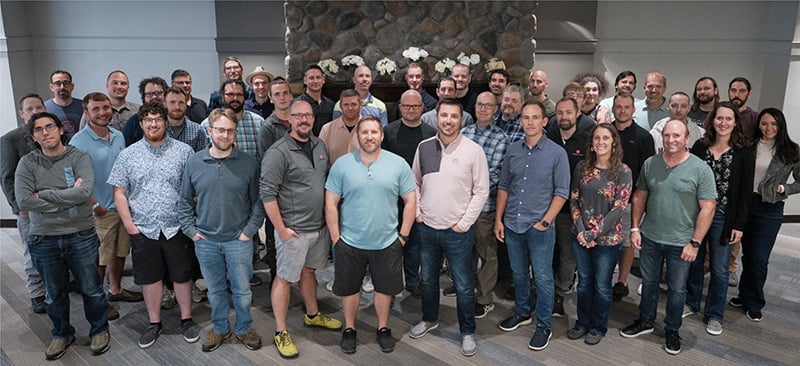In This Blog
When I started out as a software developer, success felt simple: solve problems, write great code, rinse, repeat. But after stepping into leadership, I realized the hard truth: good software doesn’t just come from great code. It comes from building the kind of team where people feel supported, challenged, and connected. And that takes more than technical know-how. It takes intention.
At Emergent Software, I manage a team of about 18 software engineers. I don’t code anymore. My role is 100% focused on people. My main priority is making sure our developers are set up to do their best work. It’s a shift I’m grateful for, and one I think more leaders in tech need to take seriously.
What It Means to Manage a Dev Team
As a manager, I spend a lot of time putting out fires, handling operations, and making sure everyone feels supported. But the heart of the job? Putting the right people in the right places...and then getting out of their way.
Our developers are incredibly talented. My goal is to clear the road ahead of them. This means making sure teams are staffed thoughtfully, matching strengths to project needs, and removing any distractions (from admin red tape to providing clarity about their benefits).
I’ve learned over time that if you hire great people, the best thing you can do as a manager is trust them to execute and be ready to step in when they need help.
The Remote Reality
Emergent Software is fully remote, which means we can hire amazing people from anywhere. But with that freedom comes a real challenge: connection.
In consulting especially, our developers are spread across multiple projects. Sometimes people on the same team barely interact outside of department meetings. That kind of separation can quietly turn into isolation.
We’ve built in systems to fight that: regular one-on-ones, cross-team mentorship, monthly dev parties, and even something we call the “fifth Wednesday” hangout, where we play games or just spend time not talking about work. When teams laugh together, they work better together. It’s simple, but powerful.
Prioritizing People
Keeping engineers motivated isn’t just about throwing them the most exciting work or showering them with praise. Sometimes it’s about asking, “How are you really doing?” and then shutting up and listening.
I never cancel one-on-ones. Ever. It’s the one reliable space where people can bring up roadblocks, personal challenges, or just vent. We can talk about projects, but we’re also sure to talk about what’s going on outside of work. Creating connections and psychological safety leads to better teams and better outcomes.
We also give our developers real opportunities to grow. Whether that’s taking on a tech lead role, mentoring, or spending learning hours diving into something new, we make sure people have space to level up.
Management Has Changed, And It’ll Keep Changing
When I think back on what managing a team looked like five or ten years ago, it’s almost unrecognizable. In-person visibility used to be a stand-in for productivity. Now, it’s all outcome-based. That shift is a good thing, but it also means you have to be a lot more intentional about how you build connection, offer support, and make sure people feel seen, especially in a remote environment.
Management now also challenges some long-held assumptions about what a leader “should” look like. When I was first approached about stepping into management, I hesitated. I didn’t fit the mold I had in my head: someone assertive, extroverted, quick to take charge. I’ve always been more thoughtful and reserved. Over time, I realized that leadership isn’t a personality type, it’s a skill set. And there’s real strength in leading with empathy, patience, and the willingness to listen.
Some of the best leaders I’ve worked with don’t dominate a room, they create space for others to step into their strengths. In engineering especially, it’s often those quieter, more intentional voices that bring the most clarity and direction. Leadership doesn’t have to be flashy, it just has to be genuine.
As the field keeps evolving, I think the leaders who thrive will be the ones who communicate clearly, stay adaptable, and prioritize people over ego.
Avoid This Common Trap: Fixing Everything Yourself
One mistake I see new engineering managers make (and I’ve been there) is trying to “fix” every problem that comes their way. When you’re a former developer, it’s tempting to jump in and write the code. But that’s short-term thinking.
Your job isn’t to be the smartest person in the room. It’s to help your team get smarter and feel empowered to do the job well. That means letting people struggle (in a safe environment) and learn. Over time, you build a stronger, more confident team.
The Best Part of the Job
There’s nothing more satisfying than hearing about a project that’s going great, especially when I’ve had almost nothing to do with it. That’s the goal, right? To build a team that runs smoothly, even when you’re focused elsewhere. when I hear that a client loved a release or that a new developer is thriving in their role, it’s a reminder that the team is strong. And that’s incredibly rewarding.
Why I Chose Emergent Software
Emergent stood out to me right away. The culture here emphasizes balance, support, and excellence. We have a very high bar for talent, and we give people the space to grow. Leadership truly invests in people. One example is that we give developers 100 hours a year to focus on learning. I think this is a huge sign of trust and support. It says: “We believe in you, and we’d be honored to help you grow.”
Final Thoughts
If you’re stepping into engineering management, here’s what I’ll say: don’t try to do it all yourself. Get to know your people. Protect their time. Be their advocate, not their overlord. The work will get done, and it’ll be better, if your team feels heard, trusted, and valued.
And if you’re curious about what it’s like to manage or build software at Emergent, I’m always happy to share more. It’s a special place to grow a team, and to grow as a leader.
Learn more at Emergent Software.
FAQ
What does a software engineering manager do?
A software engineering manager oversees a team of software developers, guiding both their technical work and professional development. While responsibilities vary by company, most engineering managers handle people management (one-on-ones, performance reviews), team planning, project alignment, and collaboration with product or business stakeholders. Some also contribute to the codebase, while others, like at Emergent Software, focus solely on supporting people and operations. The role bridges technical execution and leadership, aiming to build productive, motivated, and high-performing engineering teams.
What skills are needed to become an engineering manager?
Strong communication, leadership, and organizational skills are essential. Engineering managers need to provide clear feedback, navigate conflict, align technical work with business goals, and support developer growth. They should also understand project planning, hiring, and performance evaluation. While many start as developers, the role shifts from building software to building teams. Emotional intelligence, strategic thinking, and adaptability are just as important as technical experience.
How is an engineering manager different from a tech lead?
An engineering manager typically focuses on people management, team health, and overall delivery coordination. A tech lead, on the other hand, stays closer to the code, owning architecture decisions, reviewing pull requests, and guiding technical strategy. In some companies, one person may do both roles. In others (like at Emergent Software), the responsibilities are split to allow each person to focus on what they do best: either managing people or leading technology.
What are the biggest challenges in engineering management?
Common challenges include balancing technical oversight with people leadership, managing across time zones (especially in remote teams), avoiding burnout, and maintaining high morale. Engineering managers often have to align business priorities with realistic timelines while ensuring developers feel supported and heard. Remote and hybrid work environments have also introduced new complexities around team culture and communication.
How do engineering managers measure success?
Success is typically measured through a combination of delivery outcomes (on-time, high-quality project completion) and team health metrics, such as developer engagement, retention, and growth. A good engineering manager ensures their team is productive and thriving. At some companies, success might also include hiring and onboarding effectiveness, mentorship efforts, and cross-functional collaboration.
Do engineering managers still write code?
It depends on the company and team size. In smaller teams or startups, engineering managers often wear multiple hats, including writing code. In larger organizations or consulting firms like Emergent Software, managers may focus exclusively on people, operations, and team performance, leaving coding to individual contributors and tech leads. Over time, many managers move away from daily development work to focus on building scalable teams.
How can a software engineer transition into management?
Start by mentoring teammates, leading small projects, or taking ownership of team processes. These experiences build foundational skills like communication, delegation, and problem-solving beyond the code. Many companies offer dual career tracks so engineers can grow as individual contributors or pursue management. If you’re curious about the path, talk to current managers, ask for stretch opportunities, and reflect on whether coaching and people development excite you as much as technical work.





